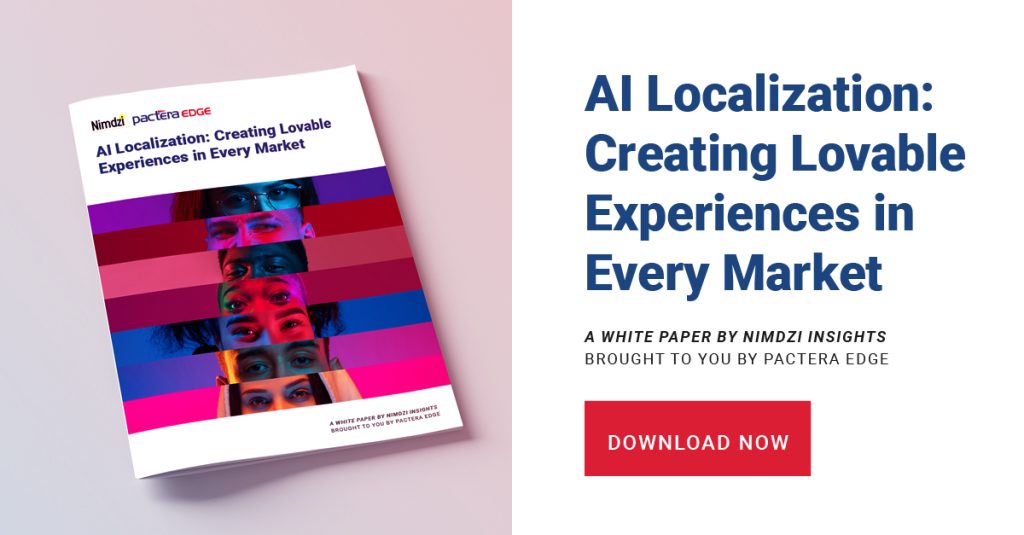Why Businesses Need AI Localization to Succeed Globally

Our latest report, produced in partnership with Nimdzi Insights, underscores the importance of artificial intelligence (AI) localization, a service that enables organizations to procure large-scale locale-aware, clean, and balanced AI training datasets through in-market data collection and curation, ensuring AI-powered products and services are equally effective across diverse local markets.
Research Findings
Nimdzi surveyed a panel of more than 1,200 respondents aged 18 and above residing in the United States, United Kingdom, France, Japan, China, and India. The surveys revealed that:
- Two out of three people agree that AI is having a profound impact on their daily habits.
- 44% of Indian users surveyed believe they are very likely to purchase a product based on recommendations by their preferred shopping website/platform.
- 86% of Chinese users surveyed claim they prefer to see personalized search recommendations.
- Tellingly, 9 out of 10 people will ignore a product if it’s not in their native language.
Taken together, these findings suggest that:
- AI has enormous potential to change how people live and work,
- AI also has enormous potential to impact purchasing decisions,
- But to have long-lasting value and relevance, the products and services that incorporate AI must be personalized, factoring in local language and culture. Failure to do so may result in people ignoring your brand altogether.
Personalization Drives the Need for AI Localization
AI localization is connected to personalization, the holy grail for businesses ranging from retailers to multimedia streaming services. AI is the most effective way to quickly achieve personalization at scale from one country to another – and continuously. For example, as the report points out, Spotify completed its latest step towards becoming a truly global product by launching in 80 new markets and 36 new languages. Spotify uses AI in a number of ways, including finding local artists and recommending them to different users based on their preferences in each country's market.
Such personalization can only be achieved when the underlying AI model is trained on the nuances of local cultures including market-specific music preferences and spoken languages. In the same way, a localized voice recognition-based product, eCommerce site, or streaming service must understand the differences between Canadian French and French, consumption trends and preferences in Tokyo compared to those in Milan, or know that in China, red is considered to be an attractive color because it symbolizes good luck.
Generic, non-localized AI-powered products and services don’t know these things unless people train them using fair, unbiased, and locally relevant data. And enterprise-level AI engines require training data on a far greater scale. (For example, for one of our clients, Centific delivered over 80 million localized data units within eight weeks.) Consequently, more people are needed to train AI to deliver better results. This is why more companies are turning to Centific for AI localization, in which our global resource pool of language service professionals provide local expertise to ensure training data is mindfully localized, accounting for the sociocultural nuances of each market.
Why AI Localization Is Increasingly Important
Nowadays, consumers around the world are pushing for a deeper level of hyper-personalization in products and services. eCommerce platforms are expected to offer near-perfect recommendations based on their customers’ purchasing habits, multimedia streaming businesses are to be able to precisely match their user’s esthetic taste with the ‘You may also like’ to ensure service stickiness, virtual personal assistants must easily understand any language accent and offer locally relevant help seamlessly and on the spot. Human centricity in AI is clearly the new global trend, putting AI localization increasingly in the spotlight:
- AI usage across the enterprise is skyrocketing.
- More businesses are operating globally. 46 percent of the top 50 websites offer more than four language choices to their overall audience to enable a localized and native experience. Increasingly, they are infusing those sites with AI-powered technology. For example, 80 percent of marketers in 2020 already had chatbots as part of their customer experience strategy.
- The payoff for AI localization is enormous: according to the research released by Centific and Nimdzi Insights in 2020, companies that localize the user experience see a 100-percent-to-400-percent increase in sales, and by localizing into just 10 languages, a brand’s message will effectively reach 90 percent of online customers.
The Nimdzi research on AI localization, commissioned by Centific, contains examples of businesses whose AI is working effectively in multiple, diverse markets, as well as recommendations on how to get started.

How Centific Can Help
At Centific, we provide AI localization services to clients around the world by combining our OneForma platform with globally crowdsourced resources who possess in-market subject matter expertise, mastery of 200+ languages, and insight into local forms of expressions, such as emoji on different social apps. We collect and localize billions of data units across a wide range of domains every year, enabling multilingual virtual personal assistants, locale-relevant search engines, enterprise-grade and machine translation engines, and automated image, text, and speech recognition solutions.
We provide AI localization services to the world’s largest corporations. We understand our clients’ needs and expectations and offer mindful and secure custom AI data solutions at scale. To learn how we can help you, contact us.
Related Centific Content
- “Centific Reveals Cultural Sensitivity Is Missing in Most Localization Efforts”
- “How AI Localization Differs from Traditional Localization”
- “AI’s Next Personalization Frontier: Local Experiences”
- “Localize to Create Lovable Customer Experiences”
- “The Convergence of Language and AI, and the Bright Future of Globalization Services”
- “How Artificial Intelligence Overcomes Language Barriers”
